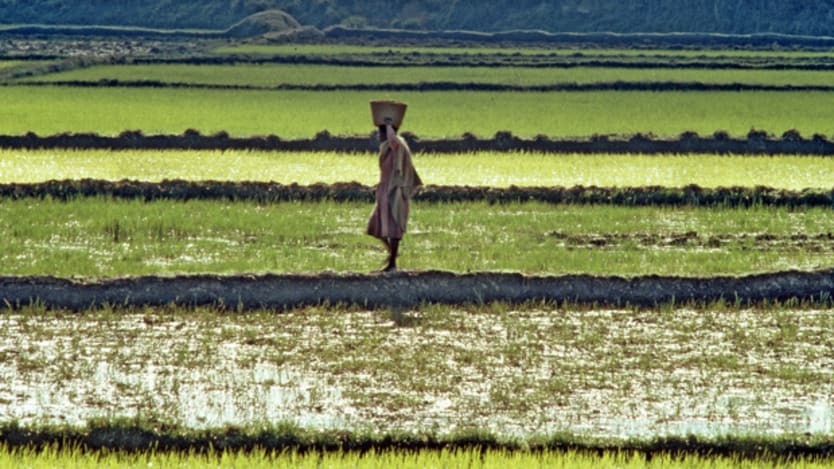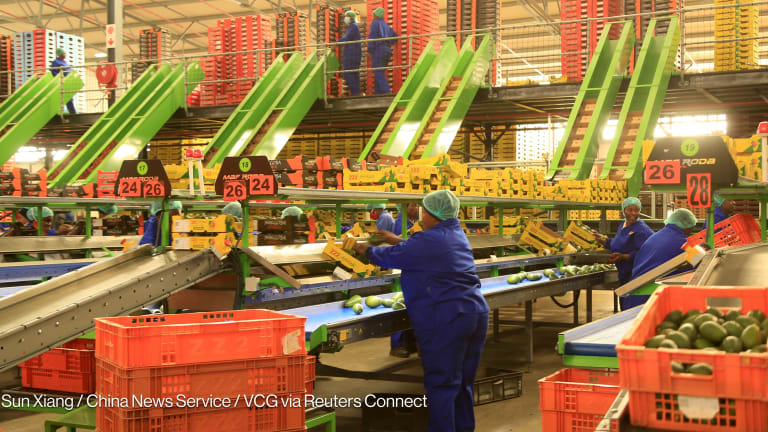
After decades of disillusionment, Africa is now on the move — but in which direction?
Recent assessments paint two very different pictures. First, there is emergent “rising Africa”: a continent being transformed by declining poverty, a shift in the labor force out of farming and the rise of an African middle class. These auspicious trends are in turn driving the modernization of the region’s food systems and long-awaited structural transformation.
Half of the world’s 10 fastest-growing economies are in sub-Saharan Africa and while much of this growth is found in the informal sector, such growth may serve as an important catalyst for broadly positive changes in the region’s agrarian economies. Many parts of the region have experienced remarkable agricultural growth over the past decade, including countries like Ethiopia and Malawi, which were characterized as food-insecure basket cases not so very long ago.
See more #FeedingDev articles:
• Food security for global security
• Working in agriculture: Don’t let theory obscure complex reality on the ground
• Gina Green: Understand communities to better manage fish stocks
• 1,000 Days: Why improving nutrition leads to long-term economic growth
At the same time, other evidence paints a decidedly less rosy picture of Africa’s development trajectory. Less than 10 percent of the region’s population could be said to enjoy anything resembling “middle class” status. There is massive concentration of wealth at the top. The growth of cities is largely in its burgeoning slums, fostering among some a continuing “dark continent” narrative. A significant proportion of African countries’ imports — including food — are supplied by other regions.
Moreover, in response to rising global demand for land and food, African governments are allocating land at a rapid pace to foreign and relatively wealthy domestic investors, moving the continent toward the latifundia, or large land estates, structures of Latin America. Perhaps not surprisingly, many of the countries experiencing high rates of agricultural growth are also experiencing stubbornly high rates of rural poverty, raising troubling questions about the extent to which the benefits of economic growth are broadly shared.
Which of these two pictures is the real Africa?
The answer, of course, is both of them. Africa is so diverse and yet so prone to generalization that it is capable of accommodating visions of both “emerging Africa” and the “dark continent” at the same time. Today’s Africa can best be understood as a swirling competition of these two visions, which is now at a crossroads.
The key point to recognize is this: The region’s real future will depend largely on the choices of its leaders. The “megatrends” commonly asserted to be transforming Africa — both the good and the bad — are neither irreversible nor inevitable. Just as current trends and transformations being observed in Africa are the outcomes of prior decades’ policies and public investment patterns, the future will be shaped and transformed by today’s policy actions — either those taken proactively or those taken passively as a result of no action. This point is underappreciated by development thinkers who speak in terms of inevitable transformations.
The evolution of Africa’s economic systems ultimately reflects the investment decisions of millions of private sector actors, most of them individual farmers and entrepreneurs. And the pace and composition of private investment is heavily influenced by the enabling environment set by governments (consider the difference between North and South Korea, for example).
Africa’s “youth bulge” — characterized by 62 percent of its population being under the age of 25 — portends that more than 350 million young people will be entering the labor force between now and 2035. Projections of nonfarm job opportunities suggest that, at best, only half of this labor force will be absorbed into wage employment, meaning that agriculture will still need to provide gainful employment for much of the remainder.
This will increase the demand for arable land to accommodate family farming at a time when high agricultural prices are generating great competing demand for land from relatively wealthy urbanites as well as from commercialized investors. These concerns lead to policy questions about appropriate and feasible agricultural strategies in the context of land-constrained farming systems and limited off-farm employment opportunities to absorb redundant labor in densely populated rural areas.
Countries such as Japan and South Korea, which now rely on manufacturing and technology-driven service economies, were predominantly small-holder farming societies 60 years ago. Through good policies and public investments in infrastructure, agricultural R&D and extension services, small-holder farmers in these countries increased their productivity and incomes, thereby supporting the demand for nonfarm businesses and the growth of employment opportunities off the farm. Over time, most small-holder farmers eventually moved into these nonfarm jobs.
Some commentators have concluded that because economic development is generally associated with the labor force’s transition from farming to nonfarm, African leaders should expedite the process by favoring commercialized large-scale agriculture and giving up on the “romanticized” vision of small-holder agriculture. However, a sober assessment will acknowledge that even in 2014, most African countries are primarily inhabited by unskilled and semiskilled rural people who are primarily engaged in farming. While most rural people might wish to put down their hoes and walk into white collar office jobs tomorrow, their levels of education and skills will prevent this from happening quickly.
If rural people were pushed off their land, either by policy neglect or by allocating the region’s prime land to outside interests, urban squalor and unemployment would only intensify — and might overwhelm governments’ capacity to cope with it. Africa’s transformation from a primarily semisubsistence, small-scale agrarian economy to a more diversified and productive economy will still require unwavering support for small-holder farmers so that they are able to participate in and contribute to the region’s economic transition rather than be marginalized by it.
Migration from farm to nonfarm sectors and from rural to urban areas will provide the brightest prospects for the transformation and modernization of Africa’s economies. But it will happen only as fast as educational advances and growth in the nonfarm job opportunities will allow, which in turn depend on income growth among the millions of families still engaged in agriculture.
Government policies and public investment policies are decisive. These will determine the incentives and scope for investment by the private sector, and will largely determine whether the region’s economic transformation is a relatively smooth, robust and peaceful process or a painful and protracted one. So, to the region’s leaders: You determine which real Africa stands up.
Want to learn more? Check out Feeding Development's campaign site and tweet us using #FeedingDev.
Feeding Development is an online conversation hosted by Devex in partnership with ACDI/VOCA, Chemonics, Fintrac, GAIN, Nestlé and Tetra Tech to reimagine solutions for a food-secure future from seed and soil to a healthy meal.










